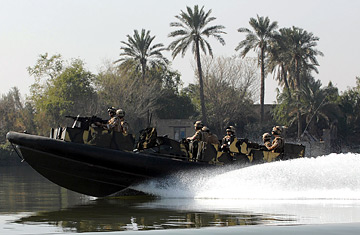
British Royal Marines from 539 Assault Squadron Royal Marines conduct operations on waterways in the Basra region of southern Iraq as part of Operation Troy.
That prospect gives some leverage to those warning of Iran's continuing push to develop such weapons and its resolute refusal to heed the demands of the United Nations and even Monday's call by its closest allies on the Security Council, China and Russia, to relent. As things now stand, Britain — and its closest ally, the United States — know they could attack Iran militarily and be sure of prevailing, though the diplomatic damage could be great.
Even as 40 of the world's biggest banks have curtailed their business in Iran — choking off Tehran's ability to finance its petroleum industry — the government of President Mahmoud Ahmadinejad shows no sign of abandoning its nuclear quest. Following Saturday's U.N. vote imposing new sanctions against Iran, Tehran announced a partial suspension of its cooperation with the International Atomic Energy Agency, the U.N.'s nuclear watchdog. While Iran declares that its nuclear-development program is solely for peaceful purposes, many Western nations believe Tehran's ultimate goal is nuclear weapons, something U.S. intelligence believes it could achieve within five years.
The financial chokehold, spearheaded by the U.S. government, is targeted at the financial dealings of the Iranian Revolutionary Guard Corps, the same group whose seaborne force grabbed the British troops. The corps, long involved in Iranian military procurement, has been expanding its role in the Iranian economy since Ahmadinejad assumed power in 2005. "The Revolutionary Guard's control and influence in the Iranian economy is growing exponentially under the regime of Ahmadinejad," Stuart Levey, Treasury's undersecretary for terrorism and financial intelligence, said in a speech in Dubai this month.
The Revolutionary Guards have been linked to the 1983 bombing of the U.S. Marines in their Beirut barracks, and are widely seen as fostering terrorism in the Middle East through groups like Hizballah. "Under the Ahmadinejad government, staffed largely by hardliners who are deeply distrustful of the United States, Iran is growing its ability to project military power with the goal of dominating the Gulf region," John McConnell, director of national intelligence, told the Senate Armed Services Committee last month. "Tehran views its mounting inventory of ballistic missiles as an integral part of its strategy to deter and, if necessary, retaliate against forces in the region, to include United States forces."
For Britain, getting its troops safely home is of paramount concern. For Washington, the longer term challenge is far more difficult: Keeping nuclear warheads off that growing fleet of Iranian missiles.
